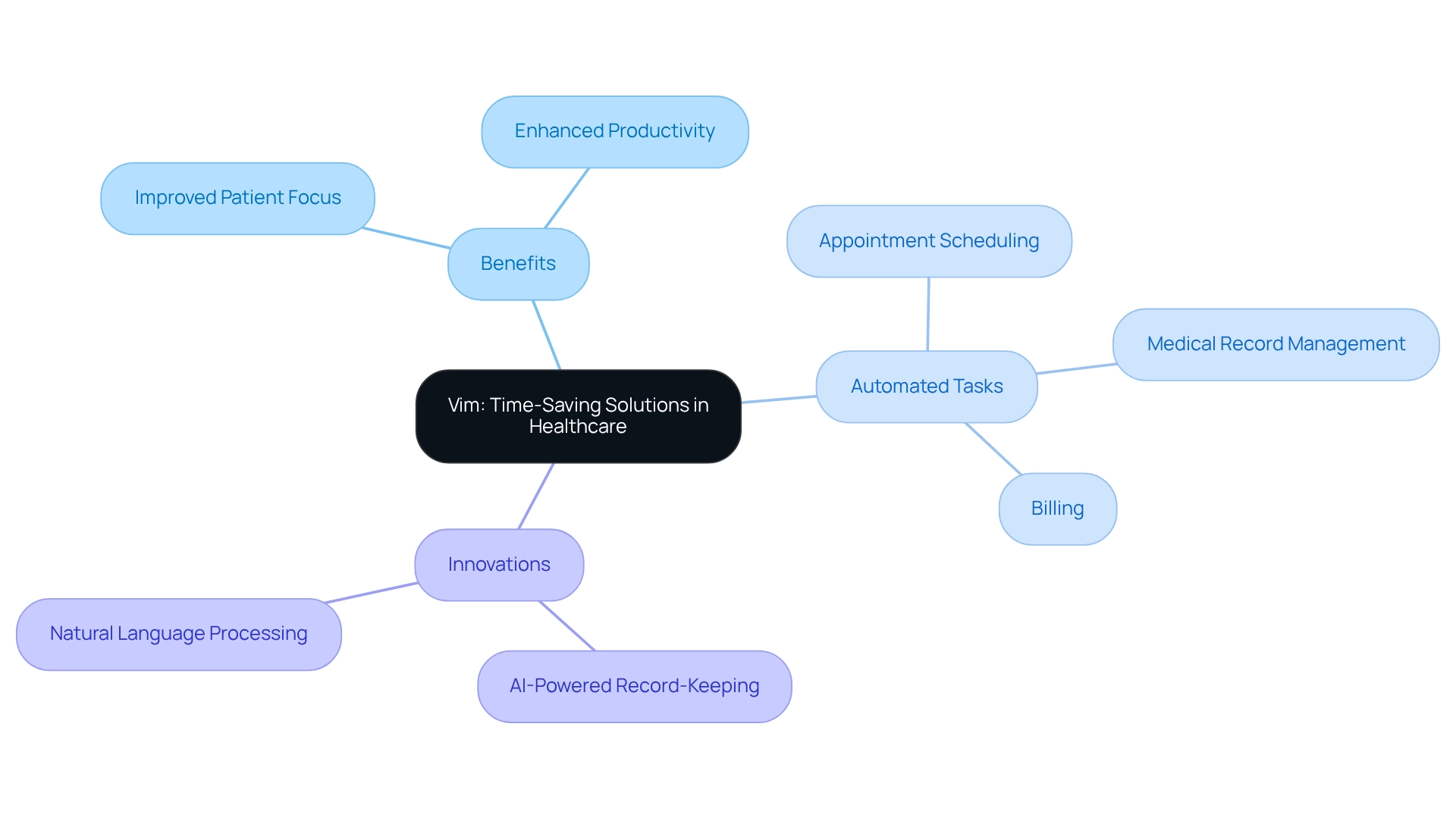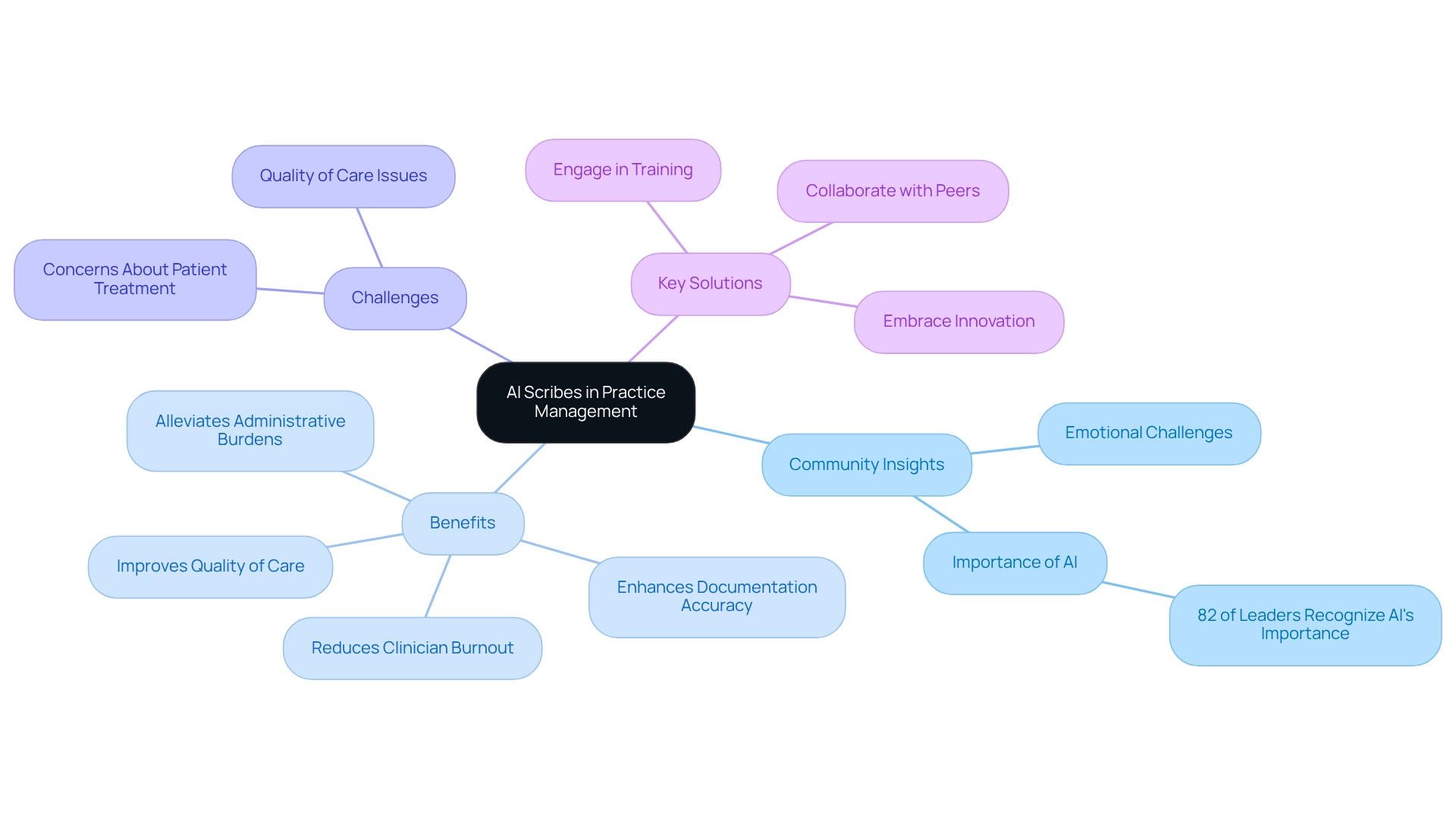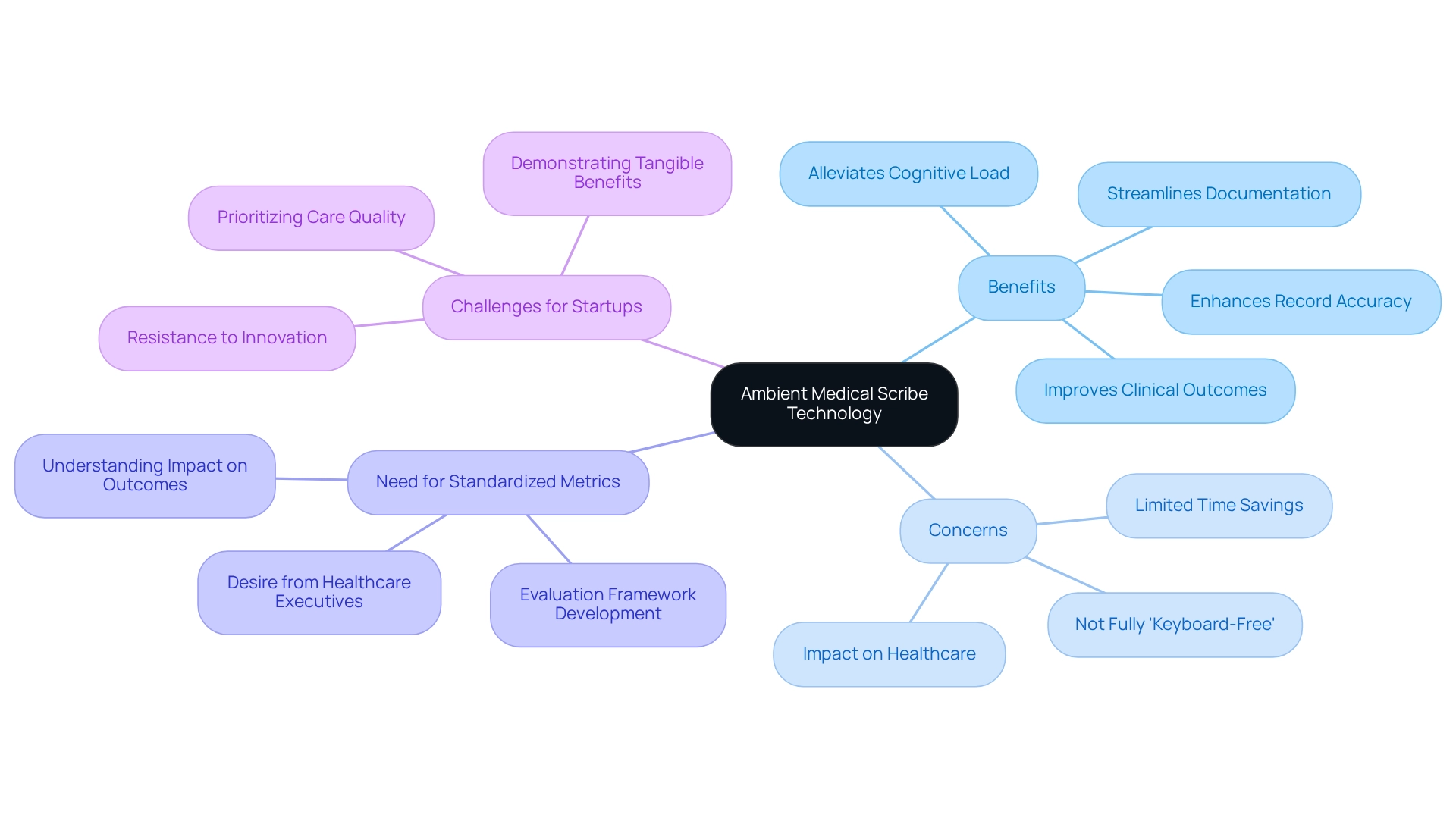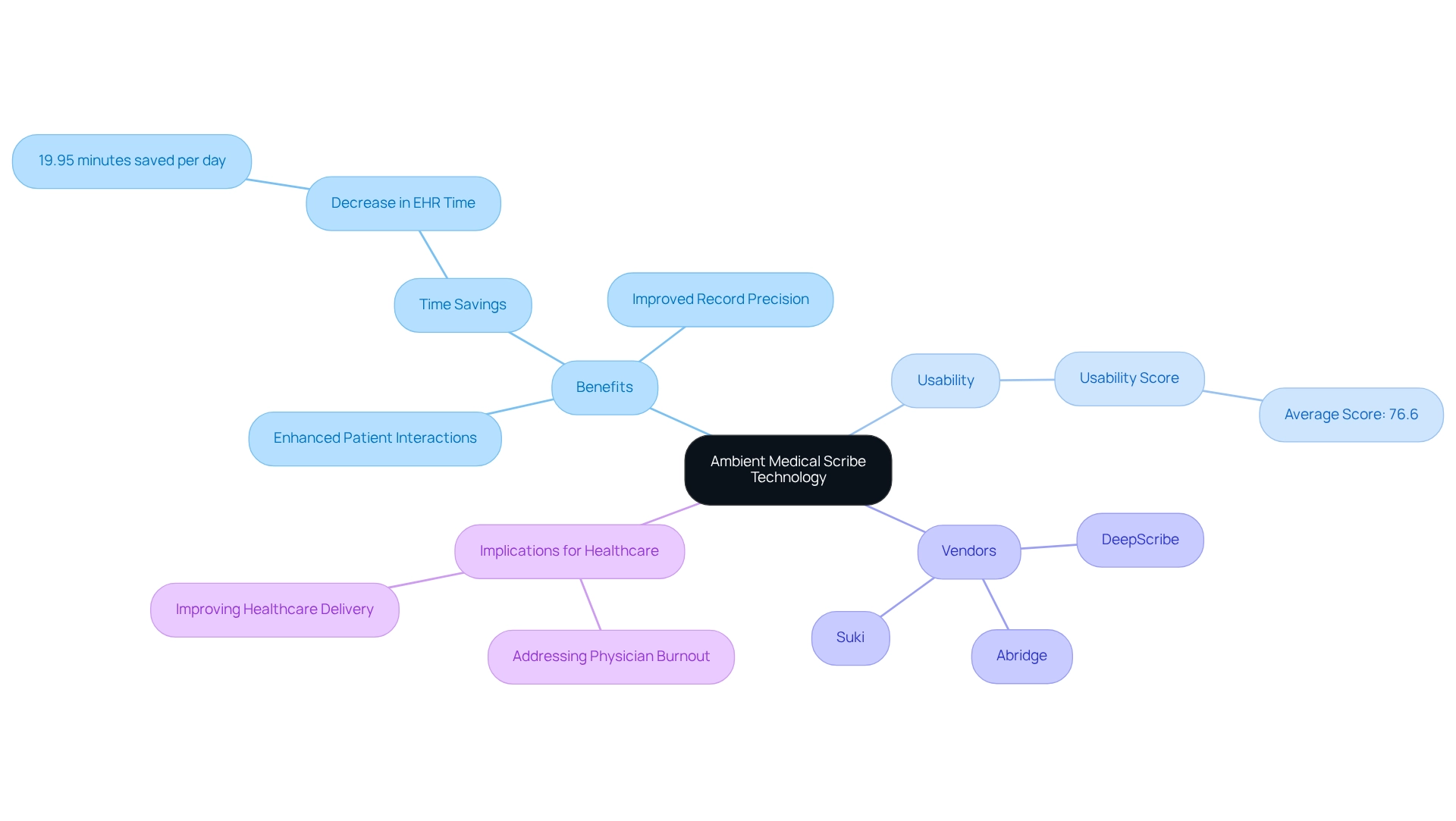Overview
In the demanding world of healthcare, providers often face emotional challenges that can impact their ability to deliver compassionate care. Have you ever felt overwhelmed by administrative tasks that take time away from your patients? Integrating ambient medical scribes into healthcare settings can alleviate these burdens and enhance the overall experience for both clinicians and patients.
The benefits of using ambient medical scribes are profound. They include:
- Improved documentation accuracy
- Reduced administrative burdens
- Enhanced clinician-patient interactions
- Increased job satisfaction among healthcare providers
These advantages collectively foster a more efficient and compassionate care environment. By embracing this innovative solution, healthcare providers can focus more on what truly matters—their patients.
Imagine a workplace where you can engage more deeply with your patients, feeling fulfilled in your role. This is not just a dream; it’s an achievable reality with the support of ambient medical scribes. Let’s take a step towards a brighter future in healthcare, where both providers and patients thrive together.
Introduction
In the rapidly evolving landscape of healthcare, many providers face overwhelming emotional challenges as they navigate the demands of medical documentation. The integration of artificial intelligence (AI) is poised to transform this experience, offering a path toward relief. Innovative companies like CosmaNeura, DeepScribe, and Ambience Healthcare are leading the charge with solutions that not only enhance efficiency but also prioritize patient interaction. This allows healthcare providers to focus on what truly matters: delivering compassionate care.
However, resistance to change remains a significant hurdle, particularly among risk-averse practitioners. Yet, the promise of AI in streamlining documentation processes shines as a beacon of hope. Imagine improving accuracy while alleviating clinician burnout—these are not just lofty ideals; they are backed by compelling statistics and real-world case studies.
This exploration delves into the various AI solutions available, their profound impact on healthcare delivery, and the ongoing dialogue surrounding the ethical implications of AI in patient care. Together, we can embrace these advancements and foster a more supportive environment for both providers and patients alike.
CosmaNeura: Transforming Healthcare Documentation with Ethical AI Solutions
CosmaNeura understands the emotional challenges healthcare providers face in today’s demanding environment. By leading the charge in transforming medical record-keeping through AI, we aim to alleviate the administrative burdens that often detract from compassionate patient care. Our platform automates essential processes like patient intake and triage, ensuring that records adhere to ethical standards while allowing providers to focus on what truly matters—their patients.
Recognizing the significant resistance to innovation within the medical field, particularly among cautious physicians, CosmaNeura addresses these concerns through the use of . This approach enhances the effectiveness of recording processes, offering the customized assistance that startups in the medical sector often struggle to find. With 75.7% of radiologists expressing confidence in AI-driven algorithms for precise results, trust in these technologies can lead to more reliable and efficient record-keeping practices in clinical settings.
Moreover, a compelling case study on AI in skin cancer detection reveals that 52% of participants view AI as a significant advancement. This highlights its potential to improve early diagnosis rates and outcomes for individuals, directly enhancing the quality of records in medical settings. As healthcare providers increasingly prioritize AI for clinical decision support—29% of U.S. hospitals are already doing so—CosmaNeura stands out by ensuring our AI solutions not only optimize administrative tasks but also align with the ethical framework of Catholic healthcare. Together, we can enhance the quality of care provided to individuals, fostering a more compassionate healthcare experience for all.
DeepScribe: Elevating Clinical Documentation with Real-Time AI Assistance
Healthcare providers often grapple with overwhelming administrative burdens that can detract from their ability to connect meaningfully with patients. DeepScribe offers a compassionate solution by employing an ambient medical scribe that utilizes advanced AI technology to support record-keeping during medical interactions. generates precise clinical notes by passively listening to conversations, significantly reducing the time clinicians spend on documentation tasks. This innovation not only lightens the administrative load but also allows healthcare providers to engage more deeply with those they serve, enhancing the overall experience of care.
Imagine a world where physicians can alleviate the burden of time-consuming tasks. With AI solutions streamlining processes like appointment scheduling and medical record management, providers can focus on what truly matters—their patients. A study on AI scribes found that 84% of physicians reported improved interactions with clients, and 82% experienced greater job satisfaction. These findings underscore the efficiency of real-time AI record-keeping by the ambient medical scribe in fostering a more patient-centered approach to treatment. Moreover, DeepScribe's commitment to provider satisfaction shines through impressive user feedback, boasting a satisfaction score of 98.8 out of 100. This remarkable level of satisfaction highlights the significant advantages of AI in clinical records, including reduced clinician workload and enhanced patient engagement. Such benefits ultimately revolutionize the landscape of medical services, creating a more supportive environment for both providers and patients.
As the sole enterprise developing AI solutions for the billion-dollar faith-centered medical sector, CosmaNeura aligns its technology with Catholic teachings. This commitment ensures that the advantages of AI record-keeping not only enhance efficiency but also uphold ethical standards in patient treatment. By embracing these innovations, healthcare providers can transform their practices, allowing them to focus on delivering compassionate care.
Ambience Healthcare: Specialty-Specific AI Scribe Solutions for Enhanced Documentation
Ambience Healthcare understands the emotional challenges that healthcare providers face daily. With specialized ambient medical scribe solutions tailored to various medical specialties, we aim to alleviate the administrative burdens that can weigh heavily on clinicians. This approach not only streamlines the documentation process but also ensures it meets the unique needs of each field. By improving the precision of clinical notes, we help reduce the mental load on healthcare professionals, who often struggle with issues like burnout and fragmented treatment.
Imagine a world where clinicians can devote more time to what truly matters—providing high-quality care to individuals. In fact, studies indicate that by 2025, the use of specialty-specific AI scribes is projected to enhance record accuracy by up to 30%. This statistic highlights the profound impact these tailored solutions can have on patient care. Furthermore, expert insights reveal that integrating an ambient medical scribe into clinical workflows not only enhances documentation but also fosters the vital face-to-face interactions that both physicians and patients cherish. As Vincent Liu, MD, noted, 'Both physicians and individuals greatly appreciate in-person interaction during a visit, and facilitates that.' The successful integration of these AI solutions with electronic health record systems, particularly through the use of an ambient medical scribe, is essential for maintaining workflow continuity and enhancing operational efficiency. By embracing these advanced capabilities, medical providers can improve their operational efficiency while keeping the well-being of individuals at the forefront. Consider the case study of CosmaNeura, which illustrates the transformative effects of adopting such technology, particularly within faith-based medical providers. This initiative addresses the challenges of innovation resistance and enhances patient-centric support.
We invite you to explore how these AI scribe solutions can make a difference in your practice, allowing you to focus on what you do best—caring for your patients.
Suki: Seamless EHR Integration for Efficient Medical Documentation
Healthcare providers often face immense emotional challenges, feeling overwhelmed by the administrative burdens that can detract from patient care. CosmaNeura's platform integrates effortlessly with existing EHR systems, simplifying medical records without disrupting clinical workflows. This addresses a significant concern for medical providers about potential service interruptions. By utilizing to automate the transcription of client interactions, our solution significantly reduces the time clinicians spend on data entry, allowing them to focus more on what truly matters: patient care. Imagine regaining multiple hours each day that were once consumed by administrative duties. This shift not only improves the precision of records but also enhances the overall effectiveness of medical services, which is crucial in a field often resistant to innovation.
For instance, case studies showcasing the use of an ambient medical scribe in telemedicine reveal that their application leads to improved documentation and patient interactions, particularly in remote medical settings. As healthcare providers reclaim valuable time, the impact on clinician productivity becomes evident, fostering a more patient-centered approach to treatment.
As Michael Tackitt, Director of Hospital and Clinic Operations, wisely notes, 'AI charting will be crucial in retaining and recruiting physicians in the future.' This statement underscores the necessity of AI in modern medical practices and addresses doctors' concerns about maintaining quality care. We invite you to explore how embracing these innovative solutions can not only alleviate stress but also enhance the quality of care provided to patients.
Vim: Automatic Documentation Solutions for Time-Saving in Healthcare
In the fast-paced world of healthcare, providers often grapple with overwhelming administrative burdens. These challenges can detract from the time and attention they wish to devote to their patients. How can we alleviate this strain and refocus on what truly matters—the well-being of individuals?
Vim offers compassionate solutions that significantly enhance time efficiency for medical providers. By capturing and organizing clinical data in real-time, Vim empowers clinicians to prioritize meaningful interactions with patients while the ambient medical scribe handles tedious administrative tasks. This capability is essential in today’s rapid medical environment, where operational efficiency is closely linked to improved outcomes.
Imagine reclaiming precious time that can be redirected toward delivering high-quality support to patients. By streamlining processes such as:
- Appointment scheduling
- Medical record management
- Billing
medical providers can alleviate the burden of time-consuming tasks. Organizations utilizing automated record-keeping solutions, such as ambient medical scribe technologies, have reported significant time savings, with many healthcare providers experiencing enhanced productivity through guided self-service technologies. Furthermore, the integration of , like those developed by Vim, is designed to enhance workflows and reduce the administrative load on clinicians. This shift promotes a more patient-focused treatment environment, allowing healthcare professionals to engage more deeply with those they serve.
Recent advancements in automation and natural language processing are transforming documentation capabilities, leading to measurable improvements in clinician satisfaction and the quality of service provided. Together, let’s embrace these innovations to foster a more compassionate and efficient healthcare experience.

The Health Care Blog: Insights on the Latest Trends in Ambient Scribing
The Health Care Blog highlights the latest trends in technology related to the ambient medical scribe, showcasing significant advancements in AI capabilities and their implications for medical service delivery. Mudit Garg, CEO and co-founder of Qventus, shares his enthusiasm, stating, 'I think I'm the most excited I've been in the last 13 or 14 years about what's coming.' This reflects a collective optimism surrounding upcoming innovations.
However, it's important to acknowledge that involving physicians in technology sales discussions often raises concerns about patient health. Many healthcare professionals may feel apprehensive about innovation, fearing it could undermine quality. This resistance can hinder the acceptance of new technologies that have the potential to enhance interactions and service quality.
These insights delve into user experiences and the transformative impact of ambient medical scribes on clinician workload and client satisfaction. As the medical landscape evolves, understanding these trends is crucial for providers aiming to implement effective documentation solutions. These solutions not only streamline administrative tasks but also enhance the quality of patient care. Notably, CosmaNeura stands out as the only company developing AI solutions for the billion-dollar faith-oriented medical market, underscoring the significance of its offerings.
Additionally, a recent case study titled 'Traditional Accelerators Aren't Equipped to Support Startup Companies in the Medical Field' suggests that conventional methods may fall short in addressing the unique challenges faced by startups in this sector. Another case study, 'Future Innovations in AI and Virtual Assistance,' indicates that as AI and progress, they are expected to drive substantial improvements in efficiency and outcomes for individuals.
While the use of an ambient medical scribe holds promise in alleviating physician workload, further research is essential to evaluate their impact across various medical specialties. With anticipated advancements in AI and virtual care by 2025, staying informed will empower healthcare professionals to leverage these technologies for enhanced efficiency and better patient outcomes.
JAMA Network: Clinician Experiences with Ambient Scribe Technology
Research published in the JAMA Network highlights a significant emotional challenge faced by healthcare providers: the overwhelming burden of documentation. emerges as a compassionate solution, improving clinician efficiency and alleviating the record-keeping strain. Clinicians have shared their relief, noting a remarkable increase in client engagement during visits. This technology allows them to focus on meaningful interactions, rather than being distracted by administrative tasks. Such a shift not only enhances clinician satisfaction but also elevates the quality of patient care.
For example, Baptist Health experienced a 6% boost in admissions attributed to AI and data-driven insights. This showcases the tangible benefits of integrating such technologies into practice. However, as Matthew J. Duggan wisely notes, "Our results suggest that current ambient scribing products may be a better fit for some clinicians or organizations than others." This observation underscores the importance of customizing solutions to meet diverse needs and addressing the inherent resistance to innovation within the medical field.
Ongoing studies emphasize the necessity for larger research initiatives to validate these promising findings across various specialties. It is crucial to reinforce the importance of clinician feedback in refining ambient scribing tools. Overall, the evidence strongly supports the transformative potential of ambient medical scribes in improving medical delivery. Yet, we must also acknowledge the challenges startups face in gaining acceptance from risk-averse providers.
As we move forward, let us embrace the potential of these technologies while remaining attentive to the unique needs of our healthcare community. Together, we can foster a supportive environment that champions innovation and ultimately enhances patient care.
White Coat Investor: Community Insights on AI Scribes in Practice Management
The White Coat Investor community understands the emotional challenges faced by healthcare providers, particularly regarding the integration of AI scribes in practice management. These tools have the potential to significantly alleviate administrative burdens, allowing providers to focus more on patient care. Members of the community share that ambient scribes enhance documentation accuracy and improve interactions with individuals, ultimately fostering . It's heartening to note that 82% of medical professionals in leadership positions recognize the importance of AI in their operations, indicating a collective move towards embracing technology in clinical environments.
However, the journey toward incorporating AI in clinical settings is not without its obstacles. express concerns about how these changes may impact patient treatment and quality. Yet, case studies reveal that implementing AI not only reduces administrative costs but also mitigates clinician burnout, leading to improved quality of care and more patient-centered practices. For instance, Lisa Rotenstein, MD, observed that "pajama time per appointment also decreased by about a minute in the overall sample," highlighting the efficiency gained through AI integration.
To address these valid concerns, it is crucial for medical providers to engage in proper training and adapt to new workflows. This ensures that the benefits of AI are fully realized, ultimately enhancing the care provided to patients. As medical providers consider adopting AI technology, these community-driven insights serve as a vital resource for navigating the complexities of practice management in 2025.
Key Solutions to Consider:
- Engage in comprehensive training on AI tools.
- Collaborate with peers to share experiences and best practices.
- Embrace a mindset open to change and innovation.
By fostering an environment of support and understanding, we can navigate these challenges together, ensuring that technology serves to enhance, rather than hinder, the quality of care we provide.

Catalyst NEJM: Research on Quality and Safety in Ambient Scribing
Recent research published by Catalyst NEJM has illuminated the quality and safety of the ambient medical scribe technology, revealing its significant benefits in healthcare settings. These innovative tools not only streamline documentation processes but also enhance the accuracy of clinical records.
However, have you ever found that initiating a technology sales discussion with a physician often leads to a maze of concerns about its impact on healthcare? By alleviating the cognitive load on medical professionals, the ambient medical scribe plays an essential role in fostering safer treatment and improving clinical outcomes.
The PHTI report highlights a pressing concern: the lack of standardized metrics to evaluate the effectiveness of AI scribes. This absence complicates decision-making for health systems contemplating investment in these technologies. Medical executives express a strong desire for standardized industry metrics to assess the impact of ambient medical scribes, underscoring the necessity for a structured approach to integrating advanced technology into medical practices.
As noted by a representative physician, while the ambient medical scribe technology is beneficial today, it is not yet a 'keyboard-free' experience, nor does it significantly save time. This observation emphasizes the importance of ongoing development and evaluation of these tools.
Moreover, healthcare startups like CosmaNeura face the challenge of navigating the inherent resistance to innovation among physicians, who often prioritize care quality over new technologies. By addressing these concerns and demonstrating the tangible benefits of using an ambient medical scribe, CosmaNeura's platform aligns with these findings by providing AI-driven services that enhance record accuracy and efficiency. This allows clinicians to focus more on patient interactions rather than administrative tasks.
Together, we can foster a supportive environment where without compromising the human touch.

PubMed: Scientific Studies on the Effectiveness of Ambient Scribes
Healthcare providers often face overwhelming administrative burdens that can detract from the quality of patient care. It’s emotionally taxing to juggle record-keeping while striving to provide compassionate support to patients. Fortunately, there is hope. PubMed showcases a wealth of scientific studies that rigorously assess the effectiveness of the ambient medical scribe technology in clinical environments. These studies consistently illustrate substantial benefits, including a decrease in record-keeping time by nearly 20 minutes each day. This efficiency not only streamlines workflows but also enhances the precision of clinical records, ultimately leading to improved clinician-patient interactions.
For instance, a large-scale pilot implementation of highlighted how these tools can alleviate documentation burdens. It’s crucial to recognize the role of clinical champions and iterative feedback in successful integration. Vendors like Abridge, DeepScribe, and Suki are leading this technology, aiding in its increasing acceptance in medical environments. Their commitment to innovation is a step towards easing the pressures faced by healthcare professionals.
Expert evaluations indicate that ambient scribing tools are user-friendly, scoring an average of 76.6 out of 100 on standardized usability assessments, as noted by Matthew J. Duggan. This high usability score underscores the practicality of these tools for medical providers. By leveraging robust scientific evidence and insights from leading vendors, medical providers can confidently consider integrating the ambient medical scribe into their practices. This integration addresses urgent issues of record-keeping and efficiency while aligning with the wider trend of employing AI-driven innovations to improve patient-centric care. Moreover, the ambient medical scribe technology can assist in closing the gaps caused by the fragmentation of medical systems, addressing concerns from providers who may be resistant to innovation. By simplifying documentation processes, these tools can alleviate some of the burdens that contribute to physician burnout, ultimately fostering a more efficient and effective healthcare delivery system. In summary, embracing the ambient medical scribe technology not only supports healthcare providers but also enhances the overall patient experience. It’s time to consider how these innovations can transform your practice for the better. What steps can you take today to explore these solutions further?

Conclusion
The integration of artificial intelligence in healthcare documentation is not merely a technological advancement; it signifies a profound shift towards more compassionate, patient-centered care. Companies like CosmaNeura, DeepScribe, Ambience Healthcare, and Vim are at the forefront of this transformation, offering innovative AI solutions that streamline documentation processes. This shift allows healthcare providers to focus on their primary mission: delivering high-quality patient care.
The evidence supporting AI's effectiveness is compelling. These technologies enhance documentation accuracy and reduce clinician workload, alleviating the emotional and administrative burdens that healthcare providers face. Many clinicians report improved patient interactions and greater job satisfaction when utilizing AI tools. This underscores AI's potential to revolutionize the healthcare landscape.
Yet, the journey toward widespread adoption is fraught with challenges. Resistance from risk-averse practitioners poses a significant barrier. It is essential for stakeholders in the healthcare sector to engage in open dialogues about the ethical implications and practical applications of AI in clinical settings. By addressing these concerns and showcasing the tangible benefits of AI, the healthcare community can cultivate an environment conducive to innovation and improved patient outcomes.
Embracing AI in healthcare documentation is crucial for creating a more efficient, supportive, and compassionate healthcare system. By prioritizing these technologies, healthcare providers can reclaim valuable time, enhance the quality of care, and ultimately improve patient experiences. The future of healthcare lies in the synergy between human compassion and artificial intelligence, promising a brighter path for both providers and patients alike.




